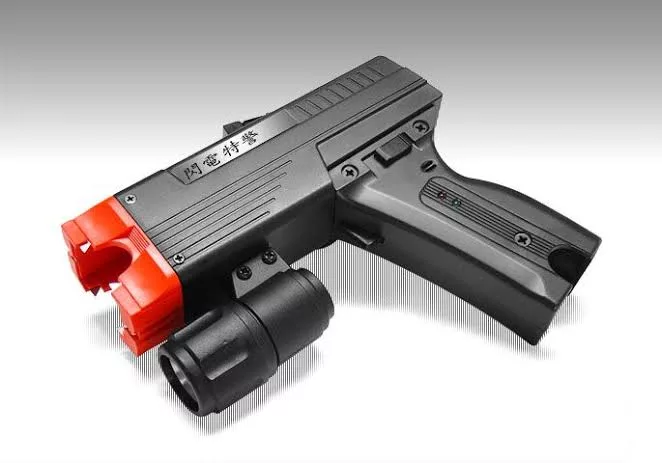In Nigeria, conversations about personal security are becoming more urgent every day. Rising cases of theft, robbery, and assault have made individuals, business owners, and even security professionals explore reliable non-lethal protection tools. Among the options, taser guns in Nigeria are increasingly discussed as an alternative to traditional firearms because they immobilize threats temporarily without causing permanent injury.
This guide provides a complete overview of taser guns in Nigeria, covering their cost, legality, availability, and registration. If you are considering them for personal defense, here’s everything you should know before making any decision.
Legal note: This article is for informational purposes only. It does not promote weapon sales or constitute legal advice. Always confirm current rules with the Nigerian Police Force or Nigeria Customs before obtaining or carrying a taser gun.
What is Taser Gun?
A taser gun is a non-lethal self-defense weapon designed to temporarily incapacitate a person using electric shock.
Here’s a simple breakdown:
-
How it works: A taser delivers a high-voltage but low-current electric charge that disrupts muscle control, causing the target to lose coordination and fall, giving the user time to escape or call for help.
-
Range: Unlike stun guns (which require direct contact), tasers can shoot two small dart-like electrodes connected by wires, allowing you to stop an attacker from a distance (usually 4–10 meters).
-
Purpose: They are mainly used for self-defense by civilians and for law enforcement to subdue suspects without using firearms.
-
Non-lethal: While they can cause pain, muscle spasms, and temporary immobilization, they are not designed to kill.
👉 In short: A taser gun is an electroshock weapon that helps protect yourself from threats without resorting to deadly force.
Why taser guns matter for personal security in Nigeria
Nigeria, like many countries, faces a wide range of security challenges. From petty theft to violent attacks, many people feel vulnerable, especially in urban centers. While self-defense training and vigilance are vital, some individuals seek additional tools that provide confidence and protection.
Taser guns (also called stun guns or electroshock devices) deliver an electric shock designed to incapacitate an attacker temporarily. Their non-lethal nature makes them appealing for people who prioritize personal safety but want to avoid the legal and moral complications that often come with carrying firearms.
Are taser guns legal in Nigeria?
The legality of taser guns in Nigeria is a complex subject. Nigeria’s Firearms Act of 1959 primarily regulates firearms such as pistols, shotguns, and rifles. Since taser guns do not use gunpowder or bullets, they are not explicitly categorized as firearms under this law.
However, legality does not mean unrestricted access. Law enforcement agencies may apply local regulations, and possession could be questioned if devices are misused. Customs authorities may also regulate the importation of electroshock weapons.
Local rules and police guidance
-
In some states or cities, police may discourage public possession of taser devices.
-
Businesses offering private security may face additional restrictions.
-
Before purchasing, always confirm with your local police division or consult a legal adviser.
Legal risks and penalties
Even if tasers are technically “less-lethal,” misusing one can result in criminal charges, especially if deployed in non-defensive situations. Treating tasers with the same responsibility as firearms is strongly advised.
Cost of taser guns in Nigeria
The cost of taser guns in Nigeria varies based on brand, model, and features. Basic models may be affordable for average citizens, while professional-grade versions are priced higher for security operatives.
Factors influencing price
-
Brand reputation: Recognized international brands cost more but provide durability and reliability.
-
Model and features: Built-in LED lights, laser sights, or rechargeable units add to the cost.
-
Power source: Rechargeable tasers may have a higher upfront cost, but are more economical long-term.
-
Accessories: Extra cartridges or holsters can increase the overall purchase price.
Average price range
-
Basic models: ₦40,000 – ₦80,000
-
Mid-range models: ₦80,000 – ₦120,000
-
Advanced/professional models: ₦120,000 – ₦150,000+
Quick comparison of taser gun models
| Model Type | Price Range | Features | Best For |
|---|---|---|---|
| Basic Models | ₦40,000 – ₦80,000 | Standard voltage, compact size | Entry-level personal use |
| Mid-Range Models | ₦80,000 – ₦120,000 | Rechargeable, LED torch, ergonomic design | Daily self-defense |
| Advanced Models | ₦120,000+ | Multiple cartridges, laser targeting | Security professionals |
Availability — Where to find taser guns in Nigeria
Many people ask, “Where can I buy taser guns in Nigeria?” While tasers may be available in the market, it is important to approach them with caution.
Potential sources
-
Specialized security equipment suppliers in major cities.
-
Authorised importers or distributors dealing in non-lethal defense tools.
-
Reputable online retailers (with verifiable addresses and warranty support).
Red flags to avoid
-
Street sellers or unverified online ads.
-
Products without manuals, serial numbers, or warranty.
-
Offers that seem “too cheap” — often counterfeits.
How to register a taser gun in Nigeria
Currently, there is no widely publicized national registration process for taser guns. Since they fall outside the Firearms Act, they are not treated the same as firearms that require licensing.
However, that does not mean you can carry them without consequences.
Practical steps to stay compliant
-
Contact the Nigeria Police Force in your state for guidance.
-
Check with Nigeria Customs Service if importing a taser.
-
Document your purchase (keep receipts and product IDs).
-
Use only for lawful self-defense.
By following these steps, you reduce the risk of falling on the wrong side of the law.
Safe and responsible use of Stun Gun in Nigeria
Even though tasers are considered “less-lethal,” irresponsible use can cause injury or legal problems. Here are key safety tips:
-
Use only in genuine self-defense situations.
-
Never aim at vulnerable areas like the head or chest unless unavoidable.
-
Seek training before handling a taser.
-
Keep away from children and unauthorized persons.
Frequently Asked Questions About Taser or Stun Gun
Are taser guns legal in Nigeria?
Tasers are not explicitly listed under the Firearms Act, but may still be restricted. Always verify with the police or Customs.
How much do taser guns cost in Nigeria?
Prices range from ₦40,000 for basic models to ₦150,000+ for advanced versions.
Where can I find taser guns in Nigeria?
Through licensed security suppliers, authorised distributors, or reputable retailers. Avoid street vendors and unverified ads.
Do I need to register a taser gun in Nigeria?
There is no official registration scheme. However, consulting police before purchase is advised.
Are taser guns dangerous to health?
They are designed as non-lethal, but prolonged shocks or misuse can cause health risks.
Is training required to use a taser?
While not compulsory, proper training is highly recommended for safe handling.
Conclusion
In a country where personal safety is a daily concern, taser guns in Nigeria are increasingly considered as a non-lethal defense option. Their affordability, ease of use, and ability to immobilize attackers make them attractive. However, understanding their cost, legality, availability, and registration requirements is crucial before making any decision.
Always prioritize safety, confirm legal status with authorities, and handle responsibly. Security begins with awareness; the right knowledge can protect both your safety and your freedom.
Legal Disclaimer
This article is strictly for educational purposes. It does not promote the sale or misuse of taser or stun guns. Readers are encouraged to seek legal advice and verify with the Nigerian Police Force or relevant authorities before purchasing or carrying any defensive device. Misuse of tasers may lead to criminal prosecution.



















